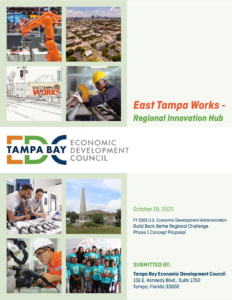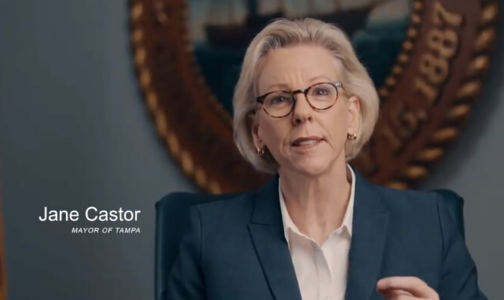To find out how the EDC can match investors and businesses in a federally Qualified Opportunity Zone, please contact:

Tony T. Brown
Vice President,
Community Development
(813) 518-2632
tbrown@tampabayedc.com
INVEST IN OPPORTUNITY ZONES
The EDC’s Opportunity Zones Program is designed to match investors with business and real estate opportunities that will generate jobs and economic prosperity for our local communities. By investing in a Qualified Opportunity Fund, which in turn, invests in real estate projects and operating businesses in designated low-income communities, investors receive tax incentives in the form of deferrals, reductions, and possible elimination of certain federal capital gains taxes.
The Tampa Bay EDC supports the Opportunity Zones program by:
- Educating investors, community leaders, developers, and other stakeholders
- Helping community partners in QOZs use this program
- Connecting investors and projects through EDC’s Opportunity Zone Venture
For more information about the Opportunity Zone program, contact Tony T. Brown at tbrown@tampabayedc.com.
Invest in the Tampa Bay Region
Information on local incentives – Target Area Programs.
If you are looking for projects to invest in, contact Tony T. Brown at tbrown@tampabayedc.com.
A Qualified Opportunity Fund specializes in attracting investors with similar risk and reward profiles to collect and place capital in rural communities, low-income urban communities, and communities targeted for revitalization and investment. Many Qualified Opportunity Zone Businesses are established to meet the regulatory requirements to attract capital from Qualified Opportunity Funds.
Qualified Opportunity Funds:
- need to be funded by private capital and guided by market principals
- need to invest 90% of their assets in opportunity zone property
- may invest in opportunity zones via stock, partnership interests, or directly in tangible business property
- need to use assets to create new business activity or expand an existing qualified business
- need to double the investment basis over 30 months if investing in existing tangible property (excluding land)
- can create new businesses or new real estate or infrastructure
- may not invest in certain types of business, such as golf courses, country clubs, gambling establishments, and a few other specifically excluded types of business
If you have realized capital gains, you need to invest your gains within a relevant 180-day period depending on the type of sale of asset into a Qualified Opportunity Fund. The QOF then needs to place 90% of the funds into qualified opportunity zone property (including Qualified Opportunity Zone Businesses) by its next relevant testing period, typically within 6-12 months.
 One page: USEDA Build Back Better Regional Challenge Grant Application Overview
One page: USEDA Build Back Better Regional Challenge Grant Application Overview- 1A Urban Planner RFP
- 1B RFP Addendum Extended Date
- Addendum 2 – Scope Change
- Addendum 2H – A&E Services
- Project Information Session presentation: Urban Planning and Land Use Services/Architectural and Engineering Services
Investors with eligible capital gains may receive tax incentives receive tax credits when they reinvest capital gains, or profits from the sale of an asset, into opportunity zones. Investors may benefit in three ways.
- They can defer paying taxes on the original capital gain until the earlier of the disposal of the investment or December 31, 2026.
- If they hold the investment for at least five years, such original deferred capital gain is reduced by 10%.
- If they hold the investment for at least ten years, they will not have to pay any capital gains tax on the appreciation in value of their opportunity zone investment.
For example, an investor sells their company stock for $1 million and has $100,000 in capital gains from that sale. The investor invests the $100,000 into a qualified opportunity fund (“QOF”) that invests in a new eligible business in an opportunity zone, including both operating businesses and real estate investment and development.
The investor can defer paying capital gains tax on the $100,000 until they have disposed of the opportunity zone investment or December 31, 2026, whichever comes first.
If they hold the investment for five years, they can reduce the deferred capital gains tax owed on the original $100,000 gain by 10%. This would mean that only $90,000 of the $100,000 gain is taxable. Assuming a 20% capital gains tax, they would owe $18,000 instead of $20,000.
If they continue to hold the opportunity zone investment for another five years (thus, holding for at least 10 years total), they will not have to pay any capital gains tax upon the exit and disposition of that investment. If their $100,000 opportunity zone investment appreciates 100% over 10 years to $200,000, they owe $0 in capital gains tax instead of $20,000 (which would have been owed upon a sale on such $100,000 of appreciation assuming a 20% federal capital gains rate). Investors can hold funds in the opportunity zone investment until December 31, 2047 before they must pay capital gains tax on their sale of such opportunity zone investment.
- Areas highlighted on this map are designated opportunity zones
- Use this search tool to see if your project is in a QOZ
- Use this search tool to see if your project is in an Hillsborough County Target Area Program
- Use the search tool to see if your project is in a Tampa CRA
- View the City of Tampa’s CRA Boundary Maps
Businesses will need to meet these qualifications to take advantage of this program.
70% of the business’ tangible property needs to be:
- acquired after 2017 from an unrelated party
- used in any opportunity zone 70% or more of the time
- original use property in the QOZ or be substantially improved
- used in a trade or business
A business needs to:
- get 50% of its revenue from active conduct of a trade or business in any opportunity zone
- use 40% or more of its intangible property in the active conduct of a trade or business in any opportunity zone
- not hold non-qualified financial property beyond reasonable working capital (including partnership interests, corporate stocks, options, cash, notes, etc.)
- operate in eligible business sectors (ineligible activities include golf courses, country clubs, gambling establishments, and a few other specifically excluded types of business)
These qualifications are defined by Treasury regulations. For more information, please consult with a tax advisor.
You will also need to consider whether you are:
- willing to give up equity in your business
- likely to grow significantly over the next 10 years
- likely to remain in a qualified opportunity zone for the 10 years or discuss structures for growing aspects of a business outside of a QOZ
Tax statements in this material regarding Qualified Opportunity Zones and Qualified Opportunity Funds under Section 1400Z-1 and 1400Z-2 of the Internal Revenue Code of 1986, as amended (the “Code”), are made for illustrative purposes and should not be relied upon. Any tax statements regarding Qualified Opportunity Funds are subject to risks and uncertainties and not specifically addressed in this material. The United States Treasury Department may issue further guidance, regulations and rules associated with Qualified Opportunity Funds and Section 1400Z-2 of the Code. Furthermore, no comment is made about the treatment for taxation purposes of payments or receipts in respect to investments in Qualified Opportunity Funds or Qualified Opportunity Zone Businesses. Each prospective investor should consult its own attorney, business adviser and tax adviser as to legal, business, tax and related matters concerning the information contained in these materials including the merits and risks involved with an investment in a Qualified Opportunity Fund.
Florida ranks #2 best state for taxpayer ROI
WALLETHUB, 2022

Tampa Bay Community Overview
Read more about the Tampa Bay community and business climate in this overview.

Featured Properties
Find out what real estate properties are available in the Tampa market.

Tampa's Placemaking Strategy
Mayor Jane Castor shares her placemaking strategy that aims to strengthen neighborhoods, build more attainable housing, and address infrastructure needs.
